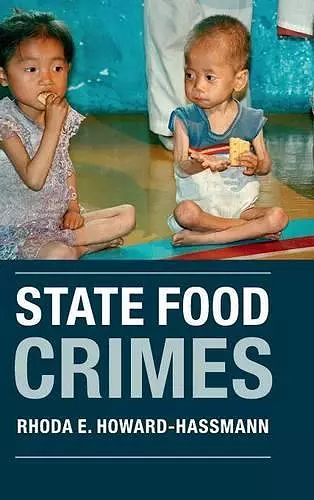State Food Crimes
Rhoda E Howard-Hassmann author
Format:Hardback
Publisher:Cambridge University Press
Published:8th Sep '16
Currently unavailable, and unfortunately no date known when it will be back
This hardback is available in another edition too:
- Paperback£25.99(9781107589964)

Discusses government policies that cause malnutrition or starvation in North Korea, Zimbabwe, Venezuela, and the West Bank and Gaza.
Some governments' policies cause malnutrition or starvation, denying the human right to food. This book describes historical and contemporary cases of state food crimes, especially in North Korea, Zimbabwe, Venezuela, and the West Bank/Gaza, and analyses how international law, sanctions, food aid, and civil and political rights affect that right.Some states deny their own citizens one of the most fundamental human rights: the right to food. Rhoda E. Howard-Hassmann, a leading scholar of human rights, discusses state food crimes, demonstrating how governments have introduced policies that cause malnutrition or starvation among their citizens and others for whom they are responsible. The book introduces the right to food and discusses historical cases (communist famines in Ukraine, China and Cambodia, and neglect of starvation by democratic states in Ireland, Germany and Canada). It then moves to a detailed discussion of four contemporary cases: starvation in North Korea, and malnutrition in Zimbabwe, Venezuela, and the West Bank and Gaza. These cases are then used to analyse international human rights law, sanctions and food aid, and civil and political rights as they pertain to the right to food. The book concludes by considering the need for a new international treaty on the right to food.
'The general legal framing that connects the issue to human rights is novel and she provides exemplary thinking-out-loud about how to measure culpability.' Stephan Haggard, Peterson Institute for International Economics
'State Food Crimes is a book of significant erudition that provides a detailed and thoughtful discussion of the most important empirical and legal dimensions of the global effort to prevent and punish state food crimes. The book is clearly intended for an audience who has some familiarity with the international legal system and of the international human rights literature, and would therefore be suitable for professionals and scholars working in the international human rights field and related fields of international relations and international law. The book would also be suitable for college course adoption, perhaps in an upper-division undergraduate or postgraduate class. While not necessarily advancing new insights or claims, it provides an effective introduction to and survey of a topic whose importance and urgency will only increase in years to come.' Eric A. Heinze, H-Diplo
'The author makes a valuable contribution on the topic by presenting a broader interpretation of what state food crime is, and highlights the centrality of previously understudied aspects relating to food security such as citizenship, mobility and property rights and the right to work for adequate access to food. The volume emphasizes the importance of domestic human rights to ensure food insecurity, but also that an international human rights treaty concerning food could still have an effect in safeguarding citizens from regimes which promote policies that increase the threat of food deprivation.' Ida Rudolfsen, Journal of Peace Research
ISBN: 9781107133525
Dimensions: 238mm x 154mm x 20mm
Weight: 520g
284 pages